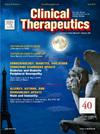The Effects of Chia Seed (Salvia hispanica L.) Consumption on Blood Pressure and Body Composition in Adults: A Systematic Review and Meta-analysis of Randomized Controlled Trials
IF 3.2
4区 医学
Q2 PHARMACOLOGY & PHARMACY
引用次数: 0
Abstract
Purpose
Growing evidence has suggested that the consumption of chia seed can decrease blood pressure and obesity in adults. However, even studies have reported uncertain findings. The current meta-analysis aimed to assess the findings of randomized controlled trials (RCTs) on the efficacy of chia seed supplementation on blood pressure (systolic blood pressure [SBP], diastolic blood pressure [DBP]) and body composition (waist circumference [WC], weight, body mass index [BMI]) in adults.
Methods
A systematic search of the literature was carried out in the PubMed, Web of Knowledge, Scopus, Cochrane Central Library, and EMBASE from inception up to October 2024. Data were extracted and analyzed using a random-effects model, and reported as weighted mean differences (WMD) with 95% confidence intervals (CI).
Findings
A total of eight RCTs involving 372 participants were included in the meta-analysis. The results showed that chia consumption significantly reduced DBP (WMD: -7.49 mmHg; 95% CI: -9.64, -5.34; P < 0.001) and SBP (WMD: -5.61 mmHg; 95% CI: -8.77, -2.44; P = 0.001). Moreover, consuming chia seeds was linked to a notable decrease in WC (WMD: -1.46 cm; 95% CI: -2.68, -0.25; P = 0.01), but it had no significant effect on, BMI (WMD: -0.31 kg/m2; 95% CI: - 0.96, 0.34; P = 0.34) and weight (WMD: 0.09 kg; 95% CI: -0.76, 0.93; P = 0.84).
Implications
Chia consumption can significantly reduce SBP, DBP, and WC in adults, but no significant impact was showed on BMI and weight. To verify these results, more studies involving a greater number of participants are required.
食用奇异籽(Salvia hispanica L.)对成人血压和身体成分的影响:随机对照试验的系统回顾和元分析》。
目的:越来越多的证据表明,食用奇亚籽可以降低成年人的血压和肥胖。然而,即使是研究也报告了不确定的结果。本荟萃分析旨在评估补充奇亚籽对成人血压(收缩压[SBP]、舒张压[DBP])和身体组成(腰围[WC]、体重、体重指数[BMI])的疗效的随机对照试验(RCTs)的结果。方法:系统检索PubMed、Web of Knowledge、Scopus、Cochrane Central Library和EMBASE自成立至2024年10月的文献。使用随机效应模型提取和分析数据,并以加权平均差异(WMD)报告,95%置信区间(CI)。结果:meta分析共纳入8项rct,涉及372名受试者。结果表明,食用奇亚酸显著降低DBP (WMD: -7.49 mmHg;95% ci: -9.64, -5.34;P < 0.001)和收缩压(WMD: -5.61 mmHg;95% ci: -8.77, -2.44;P = 0.001)。此外,食用奇亚籽与体重显著下降有关(WMD: -1.46 cm;95% ci: -2.68, -0.25;P = 0.01),对体重指数无显著影响(WMD: -0.31 kg/m2;95% ci: - 0.96, 0.34;P = 0.34)和体重(WMD: 0.09 kg;95% ci: -0.76, 0.93;P = 0.84)。结论:中国食用可显著降低成人收缩压、舒张压和腰围,但对BMI和体重无显著影响。为了验证这些结果,需要进行更多涉及更多参与者的研究。
本文章由计算机程序翻译,如有差异,请以英文原文为准。
求助全文
约1分钟内获得全文
求助全文
来源期刊

Clinical therapeutics
医学-药学
CiteScore
6.00
自引率
3.10%
发文量
154
审稿时长
9 weeks
期刊介绍:
Clinical Therapeutics provides peer-reviewed, rapid publication of recent developments in drug and other therapies as well as in diagnostics, pharmacoeconomics, health policy, treatment outcomes, and innovations in drug and biologics research. In addition Clinical Therapeutics features updates on specific topics collated by expert Topic Editors. Clinical Therapeutics is read by a large international audience of scientists and clinicians in a variety of research, academic, and clinical practice settings. Articles are indexed by all major biomedical abstracting databases.
 求助内容:
求助内容: 应助结果提醒方式:
应助结果提醒方式:


